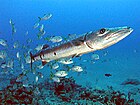
Cannery Row is a waterfront street in the New Monterey section of Monterey, California, known for formerly being home to a number of now-defunct sardine canneries. The last closed in 1973. The street name, formerly a nickname for Ocean View Avenue, became official in January 1958 to honor John Steinbeck and his novel Cannery Row. In the novel's opening sentence, Steinbeck described the street as "a poem, a stink, a grating noise, a quality of light, a tone, a habit, a nostalgia, a dream." The street borders the adjacent city of Pacific Grove.

Fishery can mean either the enterprise of raising or harvesting fish and other aquatic life or, more commonly, the site where such enterprise takes place. Commercial fisheries include wild fisheries and fish farms, both in freshwater waterbodies and the oceans. About 500 million people worldwide are economically dependent on fisheries. 171 million tonnes of fish were produced in 2016, but overfishing is an increasing problem, causing declines in some populations.
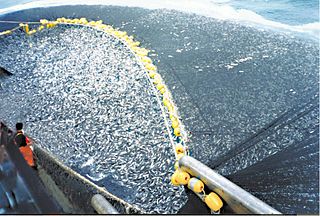
Overfishing is the removal of a species of fish from a body of water at a rate greater than that the species can replenish its population naturally, resulting in the species becoming increasingly underpopulated in that area. Overfishing can occur in water bodies of any sizes, such as ponds, wetlands, rivers, lakes or oceans, and can result in resource depletion, reduced biological growth rates and low biomass levels. Sustained overfishing can lead to critical depensation, where the fish population is no longer able to sustain itself. Some forms of overfishing, such as the overfishing of sharks, has led to the upset of entire marine ecosystems. Types of overfishing include growth overfishing, recruitment overfishing, and ecosystem overfishing.

A conventional idea of a sustainable fishery is that it is one that is harvested at a sustainable rate, where the fish population does not decline over time because of fishing practices. Sustainability in fisheries combines theoretical disciplines, such as the population dynamics of fisheries, with practical strategies, such as avoiding overfishing through techniques such as individual fishing quotas, curtailing destructive and illegal fishing practices by lobbying for appropriate law and policy, setting up protected areas, restoring collapsed fisheries, incorporating all externalities involved in harvesting marine ecosystems into fishery economics, educating stakeholders and the wider public, and developing independent certification programs.
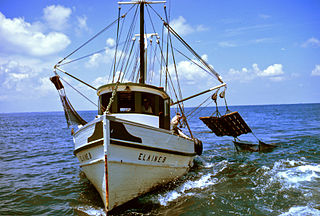
The fishing industry includes any industry or activity that takes, cultures, processes, preserves, stores, transports, markets or sells fish or fish products. It is defined by the Food and Agriculture Organization as including recreational, subsistence and commercial fishing, as well as the related harvesting, processing, and marketing sectors. The commercial activity is aimed at the delivery of fish and other seafood products for human consumption or as input factors in other industrial processes. The livelihood of over 500 million people in developing countries depends directly or indirectly on fisheries and aquaculture.

The National Marine Fisheries Service (NMFS), informally known as NOAA Fisheries, is a United States federal agency within the U.S. Department of Commerce's National Oceanic and Atmospheric Administration (NOAA) that is responsible for the stewardship of U.S. national marine resources. It conserves and manages fisheries to promote sustainability and prevent lost economic potential associated with overfishing, declining species, and degraded habitats.

The Marine Conservation Society is a UK-based charitable organisation working with businesses, governments and communities to clean and protect oceans. Founded in 1978 as the Underwater Conservation Society, the group claims to be working towards "cleaner, better-protected, healthier UK seas where nature flourishes and people thrive." The charity also works in UK Overseas Territories.

Unsustainable fishing methods refers to the use of various fishing methods used to capture or harvest fish at a rate which is unsustainable for fish populations. These methods facilitate destructive fishing practices that damage ecosystems within the ocean, and result in overfishing.
Ocean Conservancy is a nonprofit environmental advocacy group based in Washington, D.C., United States. The organization seeks to promote healthy and diverse ocean ecosystems, prevent marine pollution, climate change and advocates against practices that threaten oceanic and human life.

Marine conservation activism is the efforts of non-governmental organizations and individuals to bring about social and political change in the area of marine conservation. Marine conservation is properly conceived as a set of management strategies for the protection and preservation of ecosystems in oceans and seas. Activists raise public awareness and support for conservation, while pushing governments and corporations to practice sound ocean management, create conservation policy, and enforce existing laws and policy through effective regulation. There are many different kinds of organizations and agencies that work toward these common goals. They all are a part of the growing movement that is ocean conservation. These organizations fight for many causes including stopping pollution, overfishing, whaling and by-catching, and supporting marine protected areas.

The environmental impact of fishing includes issues such as the availability of fish, overfishing, fisheries, and fisheries management; as well as the impact of industrial fishing on other elements of the environment, such as bycatch. These issues are part of marine conservation, and are addressed in fisheries science programs. According to a 2019 FAO report, global production of fish, crustaceans, molluscs and other aquatic animals has continued to grow and reached 172.6 million tonnes in 2017, with an increase of 4.1 percent compared with 2016. There is a growing gap between the supply of fish and demand, due in part to world population growth.
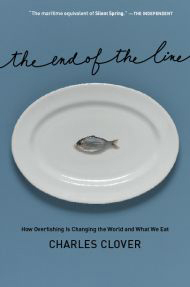
The End of the Line: How Overfishing Is Changing the World and What We Eat is a book by journalist Charles Clover about overfishing. It was made into a movie released in 2009 and was re-released with updates in 2017.
Sustainable seafood is seafood that is caught or farmed in ways that consider the long-term vitality of harvested species and the well-being of the oceans, as well as the livelihoods of fisheries-dependent communities. It was first promoted through the sustainable seafood movement which began in the 1990s. This operation highlights overfishing and environmentally destructive fishing methods. Through a number of initiatives, the movement has increased awareness and raised concerns over the way our seafood is obtained.
This page is a list of fishing topics.
Sustainable seafood advisory lists and certification are programs aimed at increasing consumer awareness of the environmental impact and sustainability of their seafood purchasing choices.
Sustainable sushi is sushi made from fished or farmed sources that can be maintained or whose future production does not significantly jeopardize the ecosystems from which it is acquired. Concerns over the sustainability of sushi ingredients arise from greater concerns over environmental, economic and social stability, and human health.
The following outline is provided as an overview of and topical guide to fisheries:
Saltwater fish, also called marine fish or sea fish, are fish that live in seawater. Saltwater fish can swim and live alone or in a large group called a school.

The Marine Policy of the Barack Obama administration comprises several significant environmental policy decisions for the oceans made during his two terms in office from 2009 to 2017. By executive action, US President Barack Obama increased fourfold the amount of protected marine space in waters under United States control, setting a major precedent for global ocean conservation. Using the U.S. president's authority under the Antiquities Act of 1906, he expanded to 200 nautical miles the seaward limits of Papahānaumokuākea Marine National Monument in Hawaiʻi and the Pacific Remote Islands Marine National Monument around the U.S. island possessions in the Central Pacific. In the Atlantic, Obama created the Northeast Canyons and Seamounts Marine National Monument, the first marine monument in the U.S. exclusive economic zone (EEZ) in the Atlantic.
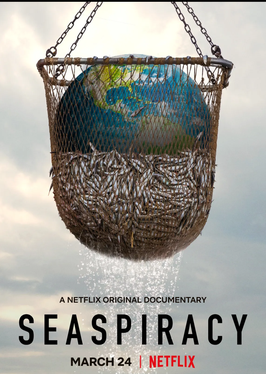
Seaspiracy is a 2021 documentary film about the environmental impact of fishing directed by and starring Ali Tabrizi, a British filmmaker. The film examines human impacts on marine life and advocates for ending fish consumption.













